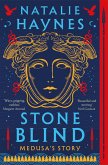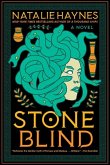Longlisted for the Women's Prize for Fiction 2023
"Haynes is master of her trade . . . She succeeds in breathing warm life into some of our oldest stories."-Telegraph (UK)
The national bestselling author of A Thousand Ships and Pandora's Jar returns with a fresh and stunningly perceptive take on the story of Medusa, the original monstered woman.
They will fear you and flee you and call you a monster.
The only mortal in a family of gods, Medusa is the youngest of the Gorgon sisters. Unlike her siblings, Medusa grows older, experiences change, feels weakness. Her mortal lifespan gives her an urgency that her family will never know.
When the sea god Poseidon assaults Medusa in Athene's temple, the goddess is enraged. Furious by the violation of her sacred space, Athene takes revenge-on the young woman. Punished for Poseidon's actions, Medusa is forever transformed. Writhing snakes replace her hair and her gaze will turn any living creature to stone. Cursed with the power to destroy all she loves with one look, Medusa condemns herself to a life of solitude.
Until Perseus embarks upon a fateful quest to fetch the head of a Gorgon . . .
In Stone Blind, classicist and comedian Natalie Haynes turns our understanding of this legendary myth on its head, bringing empathy and nuance to one of the earliest stories in which a woman-injured by a powerful man-is blamed, punished, and monstered for the assault. Delving into the origins of this mythic tale, Haynes revitalizes and reconstructs Medusa's story with her passion and fierce wit, offering a timely retelling of this classic myth that speaks to us today.
"Haynes is master of her trade . . . She succeeds in breathing warm life into some of our oldest stories."-Telegraph (UK)
The national bestselling author of A Thousand Ships and Pandora's Jar returns with a fresh and stunningly perceptive take on the story of Medusa, the original monstered woman.
They will fear you and flee you and call you a monster.
The only mortal in a family of gods, Medusa is the youngest of the Gorgon sisters. Unlike her siblings, Medusa grows older, experiences change, feels weakness. Her mortal lifespan gives her an urgency that her family will never know.
When the sea god Poseidon assaults Medusa in Athene's temple, the goddess is enraged. Furious by the violation of her sacred space, Athene takes revenge-on the young woman. Punished for Poseidon's actions, Medusa is forever transformed. Writhing snakes replace her hair and her gaze will turn any living creature to stone. Cursed with the power to destroy all she loves with one look, Medusa condemns herself to a life of solitude.
Until Perseus embarks upon a fateful quest to fetch the head of a Gorgon . . .
In Stone Blind, classicist and comedian Natalie Haynes turns our understanding of this legendary myth on its head, bringing empathy and nuance to one of the earliest stories in which a woman-injured by a powerful man-is blamed, punished, and monstered for the assault. Delving into the origins of this mythic tale, Haynes revitalizes and reconstructs Medusa's story with her passion and fierce wit, offering a timely retelling of this classic myth that speaks to us today.
"Witty, gripping, ruthless." - Margaret Atwood
"An exceptionally powerful retelling of Medusa's story, an emotional gut punch of a novel. Haynes brilliantly pulls off the feat of seamlessly alternating humour and heartbreak, creating characters that stay with you long after the novel's end. It is a dazzling achievement." - Elodie Harper, author of The Wolf Den trilogy
"Feels at once bitingly (post)modern and filled with old wisdom . . . Stone Blind acts as a brilliant and compellingly readable corrective." - The Guardian
"This dynamic retelling of a well-known myth encourages the reader to consider how legends reflect society's beliefs, and how they are shaped by tellers." - Washington Post
"The rollicking narrative voice that energises Stone Blind . . . is a voice that feels at once bitingly (post)modern and filled with old wisdom . . . The Gorgon's head will take on a new and powerful resonance as a symbol of the way stories can be warped by time. Stone Blind acts as a brilliant and compellingly readable corrective." - The Observer
"With this, her third novel based on ancient myth, [Haynes] has found a way of using all her classical erudition and her vivid sense of the ambiguous potency of the ancient stories, while being simultaneously very, very funny." - The Guardian
"A fierce feminist exploration of female rage, written with wit and empathy. Haynes makes the classics brutally relevant, and we reckon this one is going to be huge." - Glamour (UK)
"It is no exaggeration to say that Haynes is the modern embodiment of the best of Homer. She is a proper, classic storyteller, whose linguistic skills and wit will have you hanging on every word." - Radio Times
"Stone Blind is inventive and playful . . . [and] very funny." - Antonia Senior, The Times (UK)
"Pat Barker, Margaret Atwood and Madeline Miller have all successfully picked at the seams of the traditionally male take on these fantastic tales. But Natalie Haynes's genius, this time with Stone Blind, her third Greek myth novel, is to not just focus on the female experience of Greek myth but also to add zest, humour and more than a little mischief . . . The ride is gripping, funny and heartbreaking. Love, sorrow, adventure and humour - Stone Blind has it all." - Metro (UK)
"What makes a monster is the central question in Natalie Haynes' wry, spry feminist take on the Medusa myth . . . an earthy, playful yet rage-filled upending of the Greek hero trope." - Mail Online
"With wit, humanity and extraordinary imagination, Haynes breathes life and meaning into myths as she has done so brilliantly before (most famously with A Thousand Ships). She also shows that monsters can be divine or mortal. Not all heroes wear capes - and not all villains have snakes." - The i
"Haynes' clever, empathetic writing transforms Medusa from Gorgon into a girl, who's a victim of the cruel machinations of the gods and of circumstance." - Sarra Manning, Red Magazine
"Natalie Haynes has made a contemporary classic out of a classic . . . and it should win prizes." - Monique Roffey, author of The Mermaid of Black Conch
"There's real tenderness in Haynes's portrait of Medusa, a mortal abomination born into a family of divinities, and the efforts of her immortal Gorgon sisters to protect her from herself." - Daisy Dunn, The Spectator
"Haynes is [a] master of her trade . . . She succeeds in breathing warm life into some of our oldest stories." - Telegraph (UK)
"Haynes is the nation's great muse." - Adam Rutherford, The Week (UK)
"Natalie Haynes is swiftly becoming this generation's Mary Renault." - Observer
"Haynes reframes the story of Medusa from Greek mythology as one of victim-shaming in this sharp retelling... [Her] inventive reappraisal extends to her narrative devices, including rueful passages from the perspective of Medusa's severed head...and she invites the reader into Medusa's point of view with rich sensory details... Hayes conveys an urgency to Medusa's life as a mortal woman among vengeful gods. Fans of feminist retellings will love this." - Publishers Weekly
Feminist retellings of Greek myths are all the rage, and Haynes . . . stands among the foremost authors in this area. [This] novel melds her classics expertise . . . with a conversational style and biting humor. . . . This tale evokes passionate fury on behalf of its heroine, a tragic victim of male violence. Her death scene is utterly heartbreaking. It all begs the question, How could we have gotten Medusa's story so wrong?" - Booklist
"Haynes also has a delightfully droll sense of humor, which she brings to bear on her deities...By the time I finished this otherworldly cri de coeur, I felt both wiser for it and glad that it had been written." - Lucinda Rosenfeld, New York Times Book Review
"An exceptionally powerful retelling of Medusa's story, an emotional gut punch of a novel. Haynes brilliantly pulls off the feat of seamlessly alternating humour and heartbreak, creating characters that stay with you long after the novel's end. It is a dazzling achievement." - Elodie Harper, author of The Wolf Den trilogy
"Feels at once bitingly (post)modern and filled with old wisdom . . . Stone Blind acts as a brilliant and compellingly readable corrective." - The Guardian
"This dynamic retelling of a well-known myth encourages the reader to consider how legends reflect society's beliefs, and how they are shaped by tellers." - Washington Post
"The rollicking narrative voice that energises Stone Blind . . . is a voice that feels at once bitingly (post)modern and filled with old wisdom . . . The Gorgon's head will take on a new and powerful resonance as a symbol of the way stories can be warped by time. Stone Blind acts as a brilliant and compellingly readable corrective." - The Observer
"With this, her third novel based on ancient myth, [Haynes] has found a way of using all her classical erudition and her vivid sense of the ambiguous potency of the ancient stories, while being simultaneously very, very funny." - The Guardian
"A fierce feminist exploration of female rage, written with wit and empathy. Haynes makes the classics brutally relevant, and we reckon this one is going to be huge." - Glamour (UK)
"It is no exaggeration to say that Haynes is the modern embodiment of the best of Homer. She is a proper, classic storyteller, whose linguistic skills and wit will have you hanging on every word." - Radio Times
"Stone Blind is inventive and playful . . . [and] very funny." - Antonia Senior, The Times (UK)
"Pat Barker, Margaret Atwood and Madeline Miller have all successfully picked at the seams of the traditionally male take on these fantastic tales. But Natalie Haynes's genius, this time with Stone Blind, her third Greek myth novel, is to not just focus on the female experience of Greek myth but also to add zest, humour and more than a little mischief . . . The ride is gripping, funny and heartbreaking. Love, sorrow, adventure and humour - Stone Blind has it all." - Metro (UK)
"What makes a monster is the central question in Natalie Haynes' wry, spry feminist take on the Medusa myth . . . an earthy, playful yet rage-filled upending of the Greek hero trope." - Mail Online
"With wit, humanity and extraordinary imagination, Haynes breathes life and meaning into myths as she has done so brilliantly before (most famously with A Thousand Ships). She also shows that monsters can be divine or mortal. Not all heroes wear capes - and not all villains have snakes." - The i
"Haynes' clever, empathetic writing transforms Medusa from Gorgon into a girl, who's a victim of the cruel machinations of the gods and of circumstance." - Sarra Manning, Red Magazine
"Natalie Haynes has made a contemporary classic out of a classic . . . and it should win prizes." - Monique Roffey, author of The Mermaid of Black Conch
"There's real tenderness in Haynes's portrait of Medusa, a mortal abomination born into a family of divinities, and the efforts of her immortal Gorgon sisters to protect her from herself." - Daisy Dunn, The Spectator
"Haynes is [a] master of her trade . . . She succeeds in breathing warm life into some of our oldest stories." - Telegraph (UK)
"Haynes is the nation's great muse." - Adam Rutherford, The Week (UK)
"Natalie Haynes is swiftly becoming this generation's Mary Renault." - Observer
"Haynes reframes the story of Medusa from Greek mythology as one of victim-shaming in this sharp retelling... [Her] inventive reappraisal extends to her narrative devices, including rueful passages from the perspective of Medusa's severed head...and she invites the reader into Medusa's point of view with rich sensory details... Hayes conveys an urgency to Medusa's life as a mortal woman among vengeful gods. Fans of feminist retellings will love this." - Publishers Weekly
Feminist retellings of Greek myths are all the rage, and Haynes . . . stands among the foremost authors in this area. [This] novel melds her classics expertise . . . with a conversational style and biting humor. . . . This tale evokes passionate fury on behalf of its heroine, a tragic victim of male violence. Her death scene is utterly heartbreaking. It all begs the question, How could we have gotten Medusa's story so wrong?" - Booklist
"Haynes also has a delightfully droll sense of humor, which she brings to bear on her deities...By the time I finished this otherworldly cri de coeur, I felt both wiser for it and glad that it had been written." - Lucinda Rosenfeld, New York Times Book Review
Witty, gripping, ruthless Margaret Atwood, author of The Handmaid's Tale, via X (Twitter)








